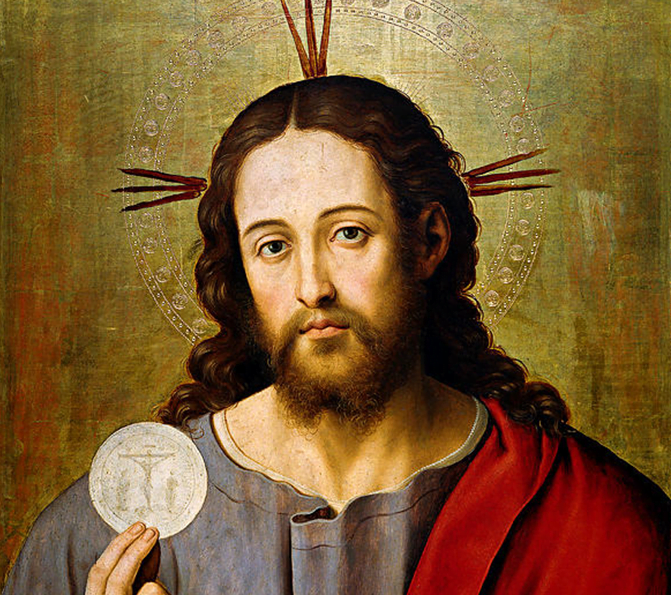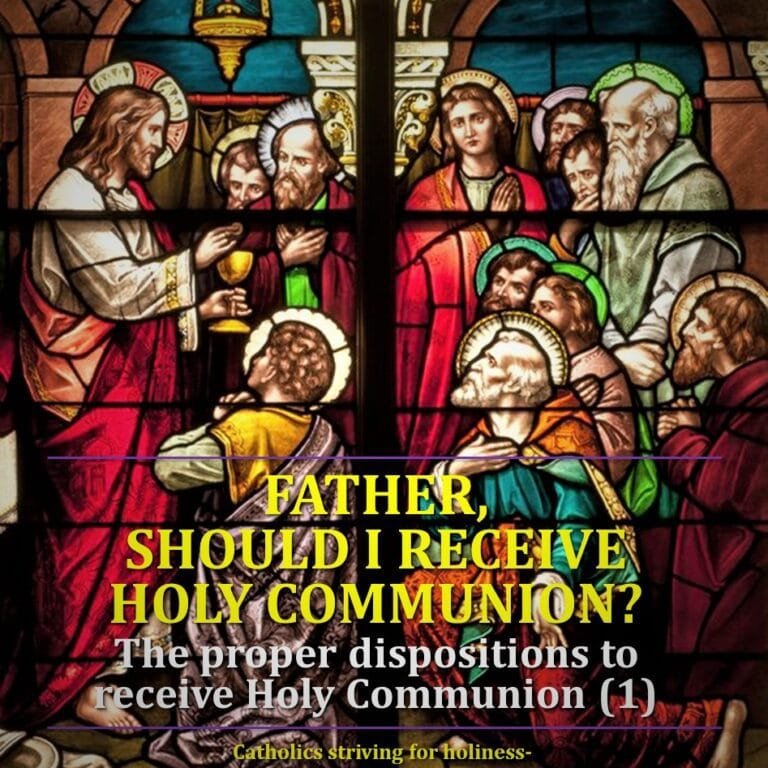FATHER, I’M NOT SURE IF I COULD RECEIVE COMMUNION…SHOULD I? THE REQUIREMENTS TO RECEIVE HOLY COMMUNION (2). Summary vid + full text.

OUTLINE
- WHAT MATTERS ARE CONSIDERED GRAVE?
- IF ONE IS NOT IN THE STATE OF GRACE (THAT IS, HAS MORTAL SINS), ONE MUST FIRST GO TO CONFESSION AND RECEIVE THE ABSOLUTION BEFORE RECEIVING THE BODY OF CHRIST IN THE HOLY COMMUNION.
- MAY ONE RECEIVE COMMUNION WITH VENIAL SINS?
In the previous post, we reviewed the Catholic teaching on the requisites to receive Holy Communion and saw that in order to receive Jesus in the Holy Communion, CATHOLICS MUST BE IN THE STATE OF GRACE, that is, NOT CONSCIOUS OF HAVING A MORTAL SIN. Furthermore, we saw that in order to commit a mortal sin, the three following elements must be simultaneously present:
- grave matter,
- full knowledge,
- and full consent.
The question arises:
1. WHAT MATTERS ARE CONSIDERED GRAVE?
BRIEFLY:
“Grave matter is specified by the Ten Commandments, corresponding to the answer of Jesus to the rich young man: ‘Do not kill, Do not commit adultery, Do not steal, Do not bear false witness, Do not defraud, Honor your father and your mother.’ The gravity of sins is more or less great: murder is graver than theft. One must also take into account who is wronged: violence against parents is in itself graver than violence against a stranger. (Catechism of the Catholic Church, 1858).”
SINCE THE TEN COMMANDMENTS ARE FORMULATED IN A GENERAL MANNER AND TO HELP PEOPLE DISCERN IF THE OBJECT THEIR ACTIONS ARE OF GRAVE MATTER, BELOW IS A LIST OF MATTERS CONSIDERED GRAVE ACCORDING TO COMPENDIUM OF CATHECISM AND THE CATECHISM OF THE CATHOLIC CHURCH, WITHOUT PRETENDING TO BE EXHAUSTIVE:
1ST Commandment:
- Polytheismand idolatry Superstition which also expresses itself in various forms of divination, magic, sorcery and spiritism.
- Irreligionwhich is evidenced: in tempting God by word or deed; in sacrilege, which profanes sacred persons or sacred things, above all the Eucharist; and in simony, which involves the buying or selling of spiritual things.
- Atheismwhich rejects the existence of God, founded often on a false conception of human autonomy.
- Agnosticismwhich affirms that nothing can be known about God, and involves indifferentism and practical atheism.
- See Compendium 445; CCC 2110-2128; 2138-2140
2nd
- Blasphemy, curses, unfaithfulness to promises made to God, false oath, perjury. Compendium 447-449; CCC 2142-2149; 2160-2162
3rd
- Not going to Holy Mass during Sundays and Holy days of Obligation without a just motive (e.g. sickness); See Catechism 1389
4th
- Negligence, infulfillment and indifference of the obligations/responsibilites towards one’s children, parents and siblings; hatred; ingratitude; disrespect; disobedience in matters concerning the material and spiritual well-being; negligence and indifference in the education in virtue and in faith of one’s children.
- See Catechism 2114-2118;2221-2229
5th
- direct and intentional murderand cooperation in it;
- direct abortion, willed as an end or as means, as well as cooperation in it. Attached to this sin is the penalty of excommunication because, from the moment of his or her conception, the human being must be absolutely respected and protected in his integrity;
- direct euthanasia which consists in putting an end to the life of the handicapped, the sick, or those near death by an act or by the omission of a required action;
- suicideand voluntary cooperation in it, insofar as it is a grave offense against the just love of God, of self, and of neighbor. One’s responsibility may be aggravated by the scandal given; one who is psychologically disturbed or is experiencing grave fear may have diminished responsibility.
- See Compendium 470; Catechism 2268-2283; 2321-2326
6th
- Grave sins against chastity differ according to their object: adultery, masturbation, fornication, pornography, prostitution, rape, and homosexual These sins are expressions of the vice of lust. These kinds of acts committed against the physical and moral integrity of minors become even more grave.
- Direct sterilization, contraception, artificial fecundation
- adultery, divorce, polygamy, incest, free unions (cohabitation, concubinage), and fornication or sexual acts before or outside of marriage
- See Compendium 492, 498, 502; Catechism 2351-2359; 2396; 2370-2372; 2380-2391, 2400
7th
- theft, deliberate retention of goods lent or of objects lost; business fraud; paying unjust wages; forcing up prices by taking advantage of the ignorance or hardship of another. speculation in which one contrives to manipulate the price of goods artificially in order to gain an advantage to the detriment of others; corruption in which one influences the judgment of those who must make decisions according to law; appropriation and use for private purposes of the common goods of an enterprise; work poorly done; tax evasion; forgery of checks and invoices; excessive expenses and waste. Willfully damaging private or public property is contrary to the moral law and requires reparation. (CCC 2409)
- slavery (2414)
- disordered desire for money (CCC 2424)
- withholding wages (CCC 2434)
- immoderate love for riches and their selfish use (CCC 2445)
8th
- Lying (in some cases CCC 2484), false witness and perjury (CCC 2476), rash judgment, detraction, calumny (CCC 2477) , adulation (CCC 2480), violation of the sacramental seal (2490) and divulgation of professional secrets (2491)
- See Compendium 523-524; Catechism 2475-2487; 2507-2509;
9th
- The ninth commandment forbids cultivating thoughts and desires connected to actions forbidden by the sixth commandment.
- See Compendium 528 ; Catechism 2517-2519; 2531-2532
10th
- This commandment, which completes the preceding commandment, requires an interior attitude of respect for the property of others and forbids greed, unbridled covetousness for the goods of others, and envy which is the sadness one experiences at the sight of another’s goods and the immoderate desire to acquire them for oneself. See Compendium 531; Catechism 2534-2540; 2551-2554
2. IF ONE IS NOT IN THE STATE OF GRACE (THAT IS, HAS MORTAL SINS), ONE MUST FIRST GO TO CONFESSION AND RECEIVE THE ABSOLUTION BEFORE RECEIVING THE BODY OF CHRIST IN THE HOLY COMMUNION.
“Anyone who desires to receive Christ in Eucharistic communion must be in the state of grace. Anyone aware of having sinned mortally must not receive communion without having received absolution in the sacrament of penance (Catechism 1415).”
3. MAY ONE RECEIVE COMMUNION WITH VENIAL SINS?
Yes. Venial sins do not break one’s friendship with God, although harm it. As the Catechism n. 1863 explains:
´”Venial sin weakens charity; it manifests a disordered affection for created goods; it impedes the soul’s progress in the exercise of the virtues and the practice of the moral good; it merits temporal punishment. Deliberate and unrepented venial sin disposes us little by little to commit mortal sin. However venial sin does not break the covenant with God. With God’s grace it is humanly reparable. ‘Venial sin does not deprive the sinner of sanctifying grace, friendship with God, charity, and consequently eternal happiness.”
With the reception of Holy Communion, venial sins are wiped away and pardoned. One also receives more grace in order to avoid them through Communion and Confession of venial sins. See Catechism 1394.
Dear brethren in Christ, let us remember that receiving Holy Communion is a gift, and hence shouldn’t be considered as a “right”. Nor are we obliged to receive Communion everytime we go to Mass just because we feel like so or think “what others would say or think” if we don’t. Let us act instead what God would feel or say if we receive Him with improper dispositions.
If we wish to receive Our Lord Jesus Christ, really, truly and substantially present in the Holy Eucharist, out of love and delicacy for God, we must make sure that we have the proper dispositions to receive Him: state of grace, one hour Eucharistic fast, proper reverence out of respect for Our Lord.
If we are have mortal sins and would like to receive Communion, let us first go to Confession and receive the absolution out of love for Jesus in the Holy Eucharist.
A great day ahead,
Fr. Rolly Arjonillo
ORIGINAL PHOTO CREDIT/SOURCES:
https://upload.wikimedia.org/wikipedia/commons/4/4d/Peter_Paul_Rubens_-Last_Supper-_WGA20255.jpg https://uploads2.wikiart.org/images/nicolas-poussin/institution-of-the-eucharist-1640.jpg!Large.jpg http://www.churchpop.com/wp-content/uploads/2015/08/11100746683_66a1c2acf2_k.jpg https://s-media-cache-ak0.pinimg.com/564x/77/e0/12/77e012464bb64e19fe5894b63842d196.jpg https://s-media-cache-ak0.pinimg.com/564x/b9/e7/37/b9e7372716d72028dc39dc2bfc6ad178.jpg https://lifesite-cache.s3.amazonaws.com/images/made/images/remote/https_s3.amazonaws.com/lifesite/the_last_supper_1_810_500_55_s_c1.jpg https://s-media-cache-ak0.pinimg.com/564x/4d/77/ef/4d77efae094998eda3b04a89d6a31aff.jpg
Stay updated: subscribe by email for free TO OUR NEW WEBSITE www.catholicsstrivingforholiness.org (PUT YOUR EMAIL IN THE SUBSCRIBE WIDGET).
We are also in www.fb.com/Catholicsstrivingforholiness. Kindly help more people in their Christian life by liking our page and inviting your family, friends and relatives to do so as well. Thanks in advance and God bless you and your loved ones! Fr. Rolly Arjonillo
